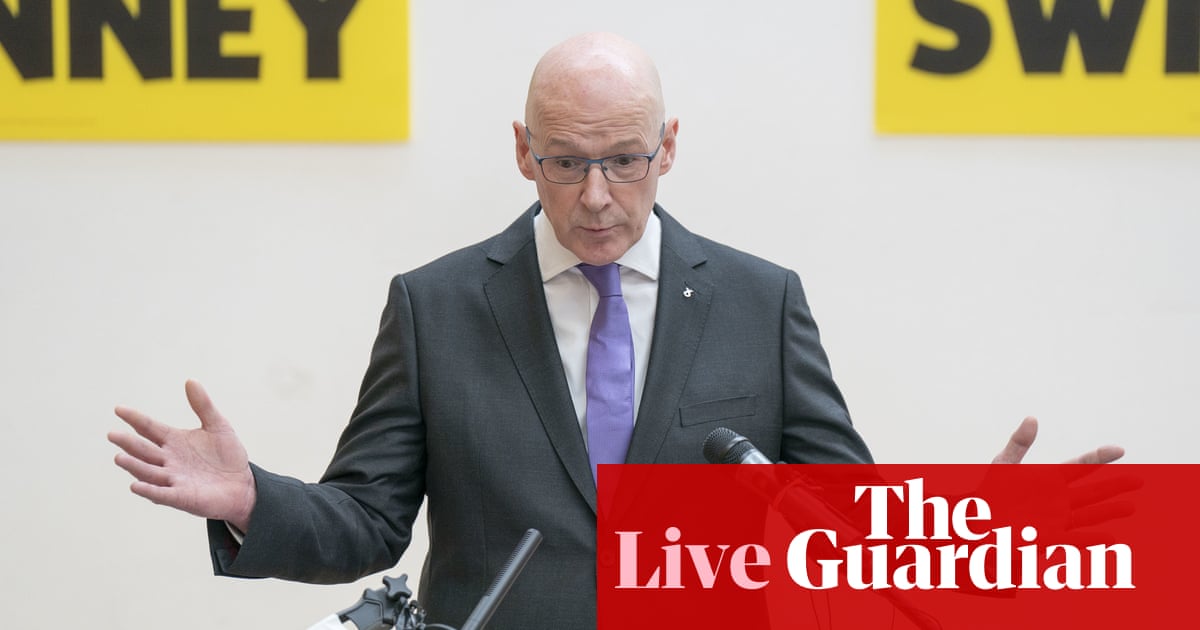Keir Starmer wants to be seen as a working-class PM. Deeds, not warm words, will determine that | Aaron Sharp


If all the indications are correct, the next prime minister of the United Kingdom will be a working-class one. Or at least, that’s what Keir Starmer wants you to believe. “I grew up working class. I’ve been fighting all my life. And I won’t stop now.” So the Labour leader declared in his keynote address at the party conference in Liverpool six months ago.
Starmer, with glitter in his hair – courtesy of the prankster who evaded security and covered him in it – and steel in his eyes, was on a personal mission that week. Speaking a stone’s throw from the banks of the River Mersey, once the artery through which wealth and opportunity was delivered to the people of the conference’s host city, he aimed to underline his own working-class credentials. To show himself to be not just another posh lawyer with a red rosette – but someone steeped in the traditions of the movement, a son of toil. A politician working people could trust again.
Did anyone buy it? Months later, and the mention of the Labour leader as a “working-class politician” is met with the kind of arched eyebrow Starmer himself is known to dish out.
“He hasn’t got a clue how we live”, one voter told me on a recent trip home to the city where I grew up. “I wouldn’t know if he’s working class”, said another. “What does he stand for? It’s anyone’s guess”. It appears that, even in a city that has long been a crucible of anti-Tory sentiment (Liverpool hasn’t returned a Conservative MP in more than half a century), Labour under Starmer feels like a “hold your nose” vote.
It’s a sentiment that is likely to be echoed in many other former industrial regions. A recent YouGov poll for the Progressive Policy Institute, the thinktank that employs Starmer’s former policy chief, Claire Ainsley, found that Labour’s lead is much narrower with working-class voters than among the wider electorate. Another YouGov poll shows 48% of working-class voters think Starmer is doing a bad job.
On the face of it, after a decade of Conservative rule, and the lies that were pumped into former industrial towns over everything from Brexit to levelling up, it may seem remarkable that Labour has not been able to re-establish itself as a safe bet in the minds of working-class voters.
But the effect of Boris Johnson’s abuse of the support he was loaned in 2019, followed by Liz Truss’ walk-on act of economic self-harm, has not just been an evisceration of Tory credibility. It has also burned a bridge of trust between those at the sharp end of an unequal society and the entire Westminster establishment. There is a lack of common ground between voters in the faraway towns and Britain’s political class – and this broken terrain is where Starmer needs to plant his red flag.
Labour will win in Liverpool; it always does. But rebuilding a deeper, sustainable support in former industrial towns is a job Starmer can’t put off, even when he is elected.
Politics in a trust vacuum is dangerous for a party of traditions, such as Labour. Liberated from the duty to cast their ballots in line with family and class, voters are inclined to make a justifiably cynical choice: go with whoever is offering the best short-term deal. The fall of the “red wall” was a product of those very conditions, and with the populists of Reform throwing their outsized political weight around, working-class support can’t be taken for granted.
For Starmer, the route back to that trust will take more than cosy words of class solidarity. So far, his office has placed a high tariff on language, reminding voters time and again that he grew up in a “pebbledash semi”. And with Wes Streeting, the scrappy shadow health secretary, jawing off in the Sun newspaper about “middle-class lefties”, it all feels very concerted.
Meanwhile, in the real world, for families struggling to put food on the table and keep a roof over their heads, that kind of talk is cheap – and the time now is for policy, not platitudes. This, so far, is where Labour has been found wanting.
For all his promises to fight for working people, Starmer’s growing list of U-turns on pledges pointed at low-income families is beginning to look less like blows landed in an assault on inequality than punches pulled.
The promise of universal free childcare for children over nine months has been revised to a means-tested system, and despite Labour describing the current two-child benefits cap as “one of the single most heinous elements of the system”, the party will retain it if it comes to power. Meanwhile, Rachel Reeves’s pledge of £28bn a year to invest in green jobs and industry looks as if it’s on shakier ground than a Cuadrilla fracking site.
The cumulative effect of these watered-down pledges is a creeping suspicion among voters that Starmer’s Labour isn’t quite the class-allied engine of change he promised on the banks of the Mersey in October.
Starmer recently evoked Margaret Thatcher as an example of dynamism – much to the irritation of those in Liverpool old enough to remember the chilling days of “managed decline” – but had he a better reference, he may have got a fairer hearing.
When the 1981 Toxteth riots in Liverpool cast a national spotlight on the area’s social unrest, it was the unlikely figure of Michael Heseltine, the bouffant-haired Tory environment secretary, who set about building the argument for a public and private investment in the city. In a time of broken social contracts, mistrust and bad faith, Liverpool didn’t need a docker, a miner or the son of a toolmaker – it needed someone with a plan and the courage act on it. Therein lies a lesson for this Labour project: words are fine, but deeds are what people want.
If Starmer can resist an election pitch centred on empty, class-based homilies, and instead deliver a policy agenda that can inspire hope as much as it dampens suspicion, electoral victory – and a meaningful memorandum of understanding between Labour and the working people it should represent – will be the prize. Both sides need that to happen.




